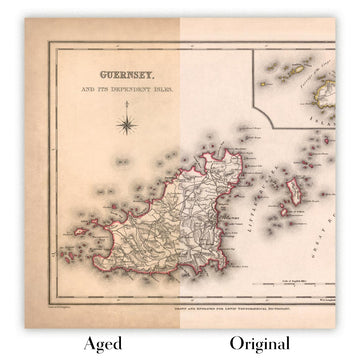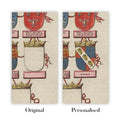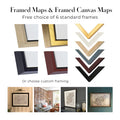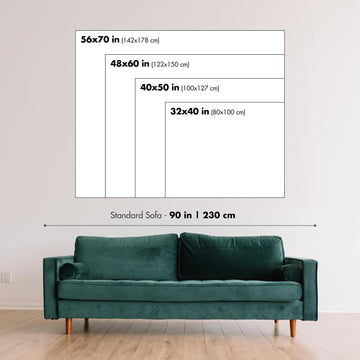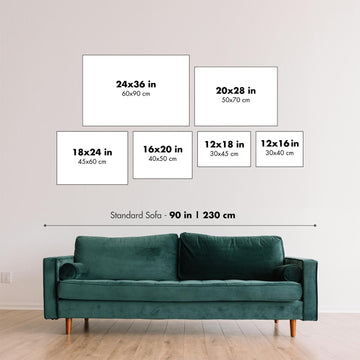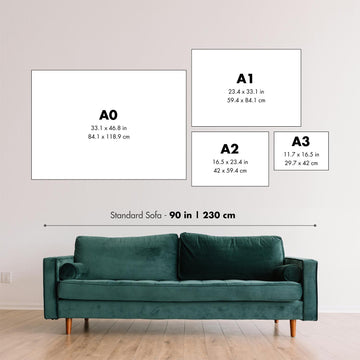

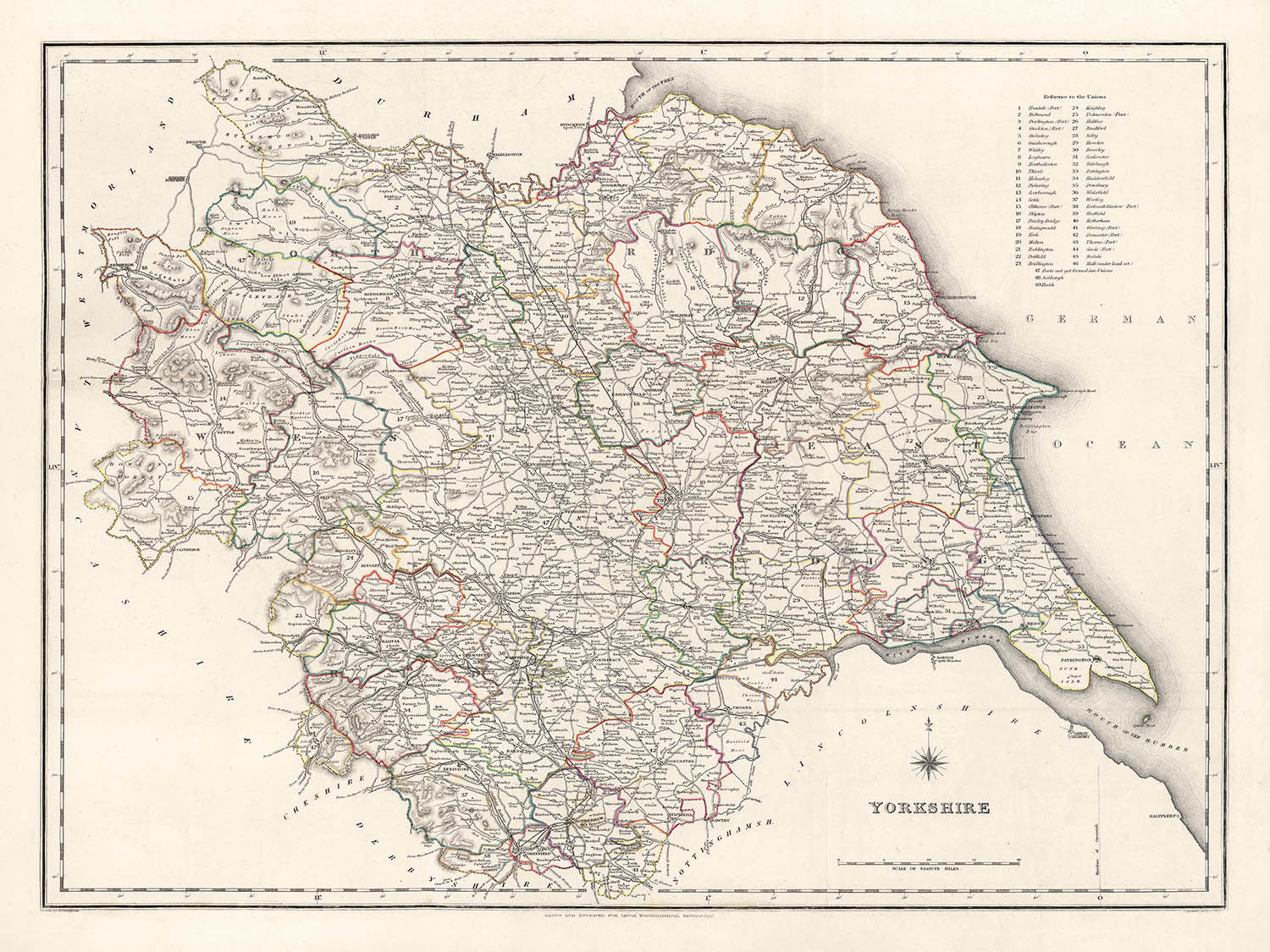

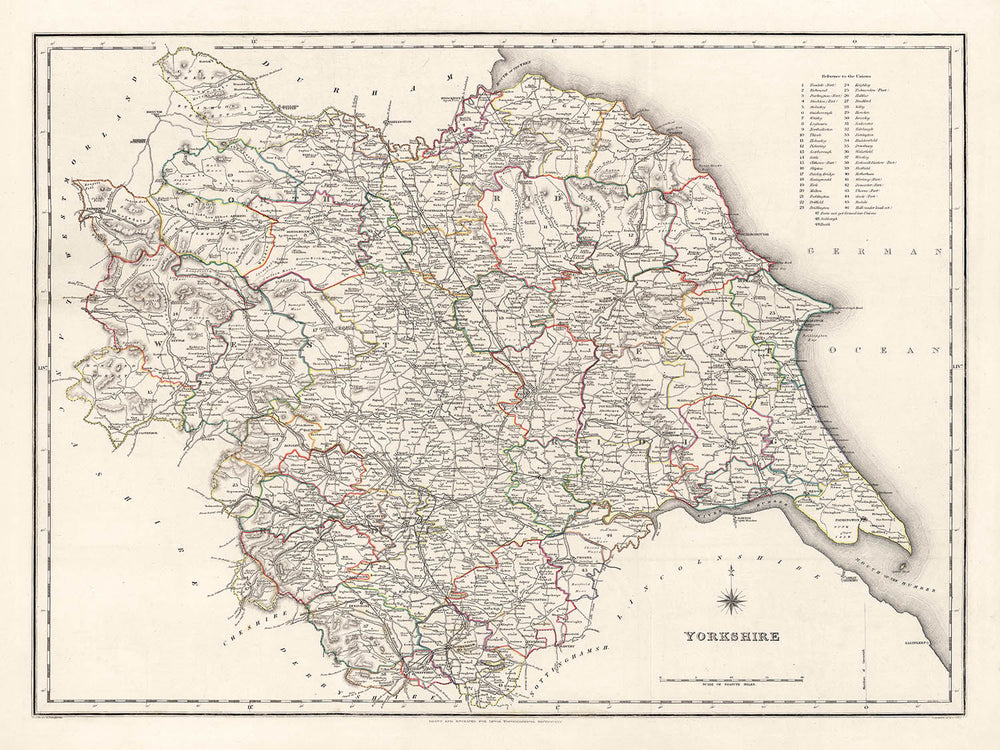

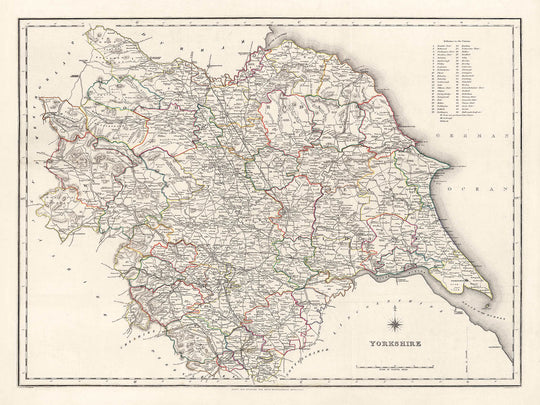








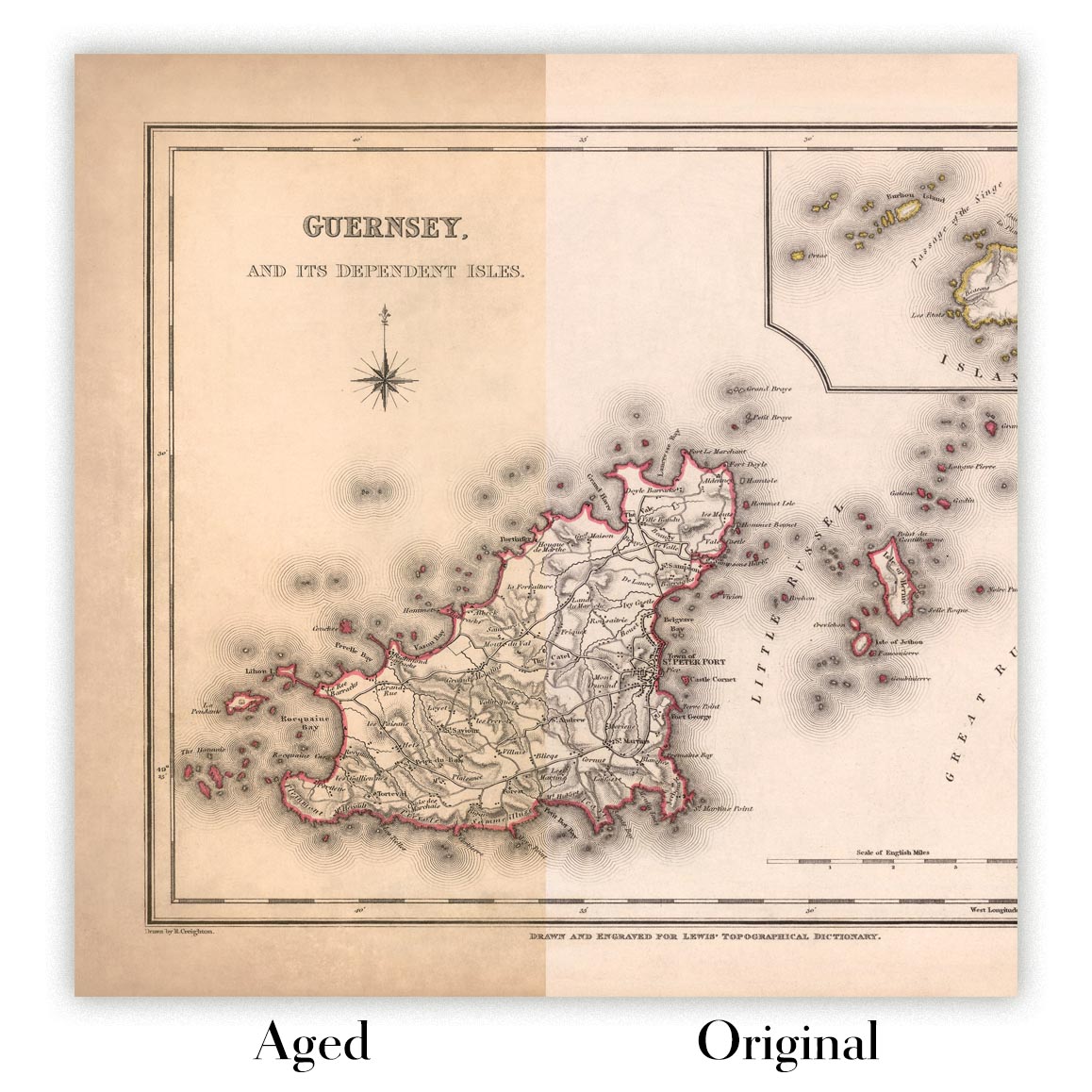
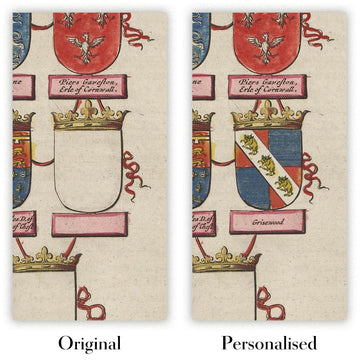



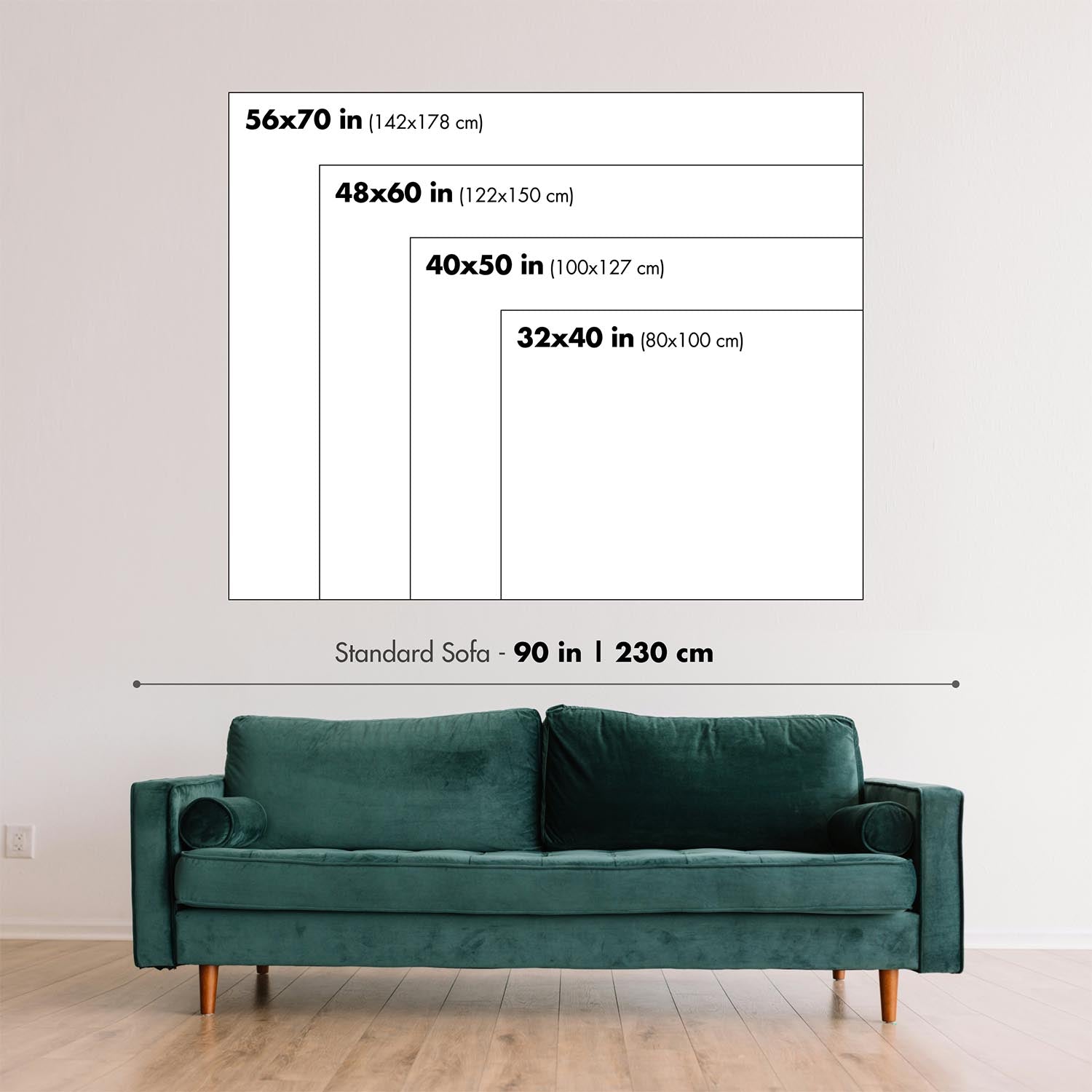
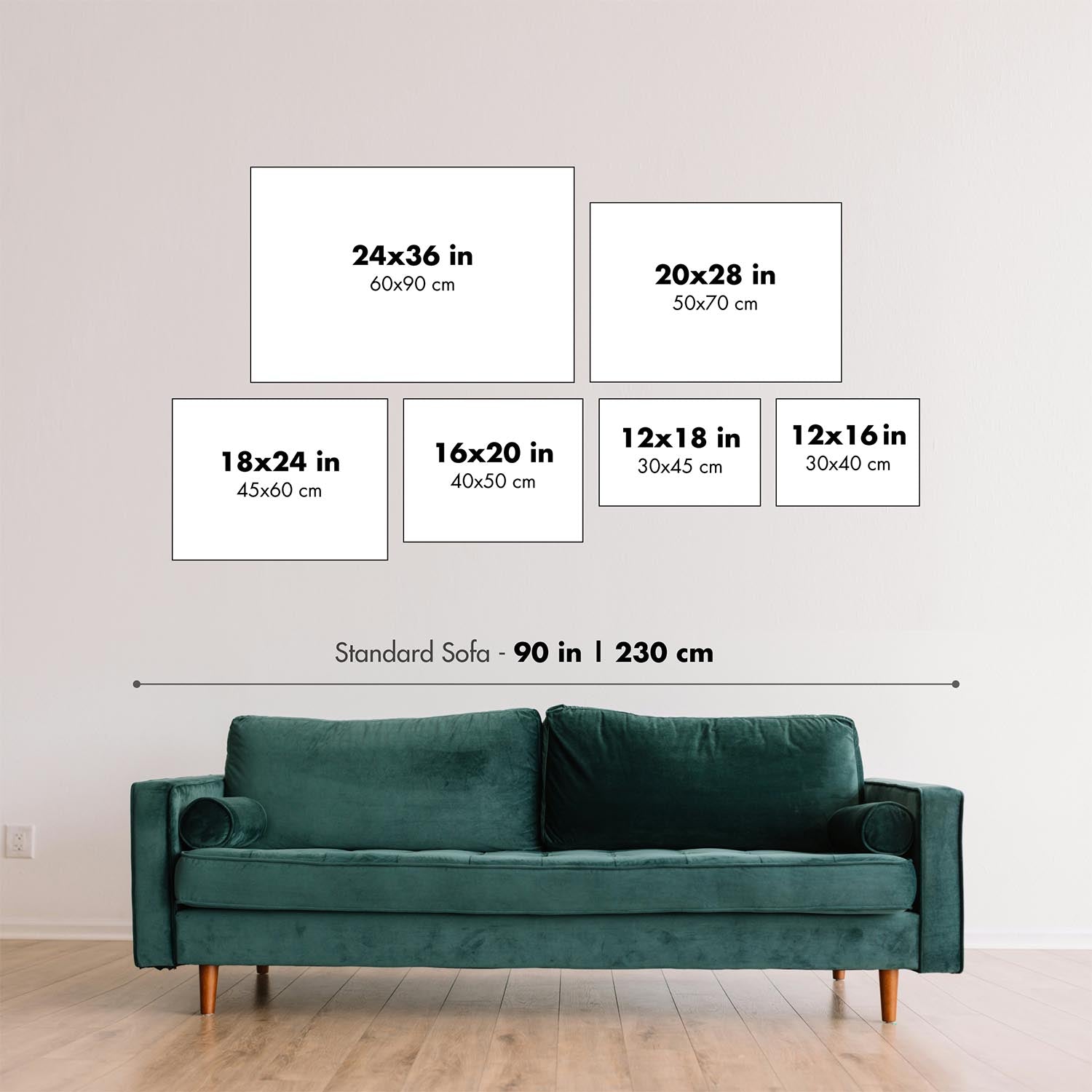
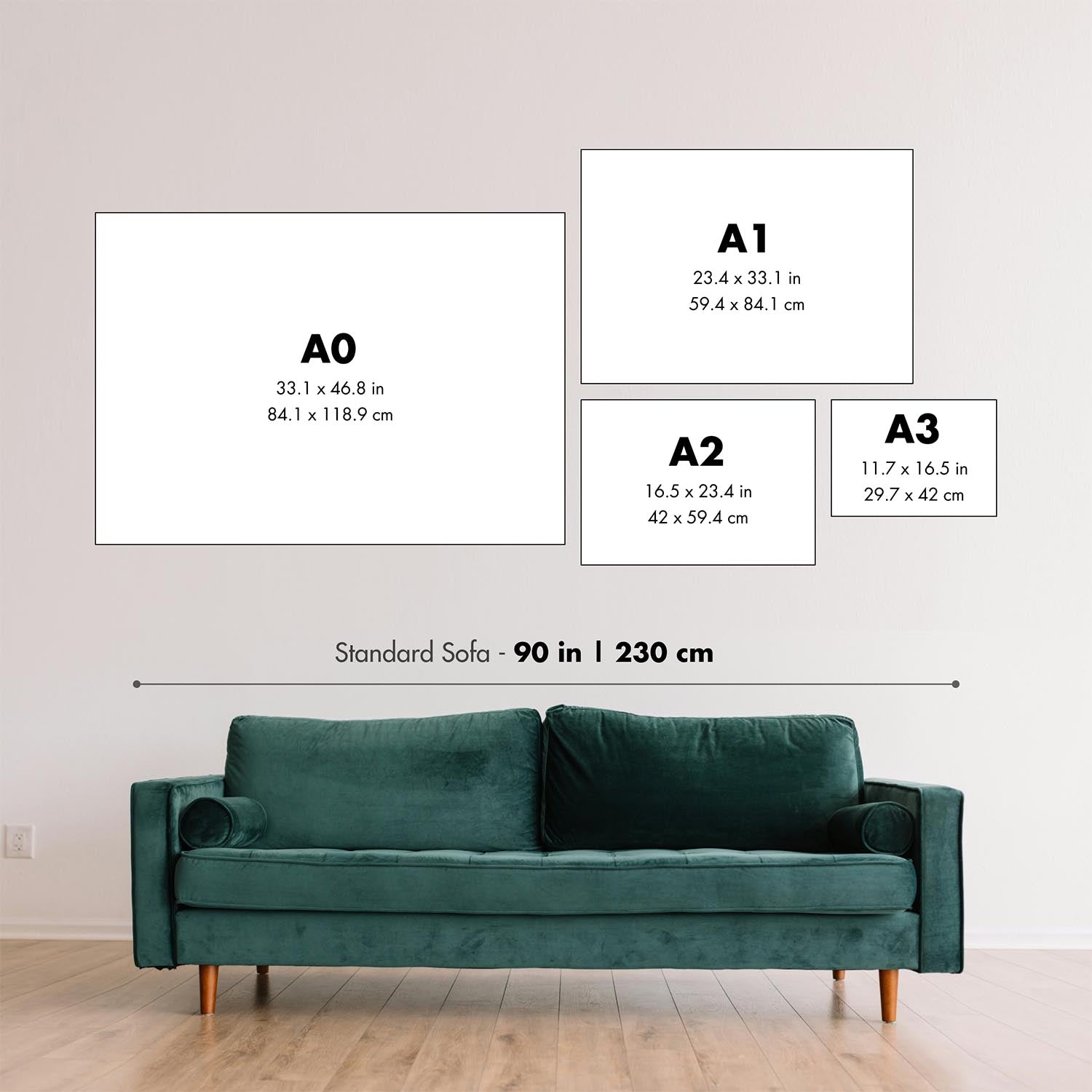
Old Map of Yorkshire by Samuel Lewis, 1844: Leeds, Sheffield, Bradford, Kingston upon Hull, and York


-
![]() Handmade in Canada
Handmade in Canada
-
FREE worldwide delivery in 2-3 days ⓘ
Free Christmas delivery in 2-3 days
Your map should be delivered in 2-3 working days with free delivery, worldwide.
We make maps by hand locally in 23 countries, including Canada
![]() . If you're buying a gift for someone in another country, we will make the map locally to them.
. If you're buying a gift for someone in another country, we will make the map locally to them.You will never pay import tax or customs duty.
Check the Christmas delivery guide for order deadlines.
Express delivery is available at checkout which can reduce the delivery time to 1-2 days.
Please note that personalised maps, and larger framed maps, can take longer to produce and deliver.
If you need your order to arrive by a certain date, contact me and we can discuss your options.
-
90 day money back guarantee
ⓘ
90 days to return and refund
Products can be returned within 90 days for a full refund, or exchange for another product.
For personalised and custom made items, we may offer you store credit or a non-expiring gift card, as we cannot resell personalised orders.
If you have any questions, get in touch. For more information, see our full returns & exchanges policy.

My maps are rare, museum-grade, restored old maps sourced from libraries, auction houses and private collections across the globe.
Framing & free personalisation available
1. Select your size
➢ Pick the closest size (above)
➢ Provide the exact size in millimetres
➢ Add to bag and checkout as normal
2. Frame & personalise your map
Make your map unique with framing, hand-drawn customisation, vintage ageing, pop art text, unique 3D styling and moreGift message & custom finish

If you want to add a gift message, or a finish (jigsaw, aluminium board, etc.) that is not available here, please request it in the "order note" when you check out.
Every order is custom made, so if you need the size adjusted slightly, or printed on an unusual material, just let us know. We've done thousands of custom orders over the years, so there's (almost) nothing we can't manage.
You can also contact us before you order, if you prefer!

- Handmade locally. No import duty or tax
- FREE Delivery. Arrives in 2-3 days
- Love it or your money back
- Questions? WhatsApp me any time
Own a piece of history
5,000+ 5 star reviews


Step back in time with this breathtaking, meticulously detailed map of Yorkshire from 1844, crafted by the revered mapmaker Samuel Lewis. This work of art meticulously depicts Yorkshire's historic county boundaries in a time where many of its towns and cities were in the early stages of their industrial ascent. It's a window into an age gone by, where some modern cities may not have yet existed, or existed under a different name, providing an intriguing narrative about the development of this historically rich region.
This stunning piece not only holds immense historical value but also serves as an excellent talking point. Whether it's the profound transformation of Leeds from a modest market borough to a bustling industrial city or the enduring charm of York, this map delivers a fascinating insight into Yorkshire's past. It is a perfect piece for historians, cartographers, or anyone with an interest in the rich tapestry of Yorkshire's past. The map's timeless aesthetic makes it an excellent addition to any decor.
Notable Towns and Cities:- Leeds (5th Century): Leeds was a small manorial borough in the 13th century, and in the centuries that followed, it expanded and developed into a major centre for the production and trading of wool.
- Sheffield (circa 8th Century): Known for its significant role in the Industrial Revolution, Sheffield started as a small village centered around Sheffield Castle.
- Bradford (Middle Ages): Bradford grew rapidly during the 19th century as an international centre of textile manufacture, particularly wool.
- Kingston upon Hull (12th Century): Founded by Edward I, Hull has been a market town, military supply port, trading hub, and industrial metropolis.
- York (71 AD): Founded by the Romans as Eboracum, York was the capital of the Roman province of Britannia Inferior.
- Wakefield (Wakefield Charter of 1203): Wakefield was dubbed the "Merrie City" in the Middle Ages and was historically the capital of the West Riding of Yorkshire.
- Doncaster (1st Century AD): Originally an occupied Roman fort called Danum, Doncaster has long been a wealthy area due to its strategic importance on the River Don.
- Rotherham (9th Century): In the Middle Ages, Rotherham was a key centre of the iron industry and later became a principal southern Yorkshire coalfield.
- Halifax (12th Century): Halifax is known for its rich history in wool, its impressive Victorian architecture, and the unique Piece Hall.
- Barnsley (Middle Ages): Barnsley became a hub for linen production in England, fueled by its access to coal and iron.
- Huddersfield (1066): Huddersfield was a market town known for its role in the Industrial Revolution, and for being the birthplace of rugby league.
- Harrogate (16th Century): A popular tourist destination and spa town, its springs were discovered in the 16th century.
- Scarborough (966 AD): This historic resort town on the North Sea coast is Britain's first seaside resort.
- Batley (Late Middle Ages): During the Industrial Revolution, Batley was one of the leading centres for shoddy and mungo, cheap cloth made from recycled or shredded wool rags.
- Keighley (Middle Ages): Keighley's mills produced textiles to equip soldiers, contributing greatly to the war effort during the Napoleonic Wars.
- Castleford (Roman Times): Castleford's history dates back to Roman times, when it was called Lagentium.
- Pontefract (1086): Pontefract was an important market town with a royal castle in the Middle Ages.
- Wetherby (12th Century): Wetherby was a staging post for travelling between London, the North, and Scotland.
- Beverley (7th Century): Beverley was a place of pilgrimage for many, having been a sanctuary for criminals in the Middle Ages.
- Middlesbrough (1830): Middlesbrough was a farmstead which became an industrial giant due to the coal and iron industries.
- Pocklington (1st Century AD): Known as the "Gateway to the Yorkshire Wolds", Pocklington is an ancient market town, founded by the Angles.
- Ilkley (Roman Times): Ilkley was a Roman fort, and today is famous for its moorland.
- Northallerton (Roman Times): The Romans had a signal station here and the Vikings were the ones to give it its name.
- Richmond (1071): Richmond Castle, built in 1071, had a big influence on the development of the town of Richmond.
- Selby (14th Century): Selby has a rich maritime history and is the birthplace of King Henry I of England.
- Hornsea (12th Century): A small seaside resort town, Hornsea is known for its Victorian era charm.
- Hedon (12th Century): Hedon was an important trading port, the foundations of which are still visible today.
- Howden (7th Century): It's an historic market town with a beautiful Minster that once was an important ecclesiastical centre.
- Knaresborough (1086): Knaresborough Castle dates back to Norman times, and the town is full of fascinating history.
- Skipton (1086): Skipton, the "Gateway to the Dales," has a well-preserved medieval castle.
- Yorkshire Dales National Park: Established in 1954, the park is famous for its stunning landscapes, rich cultural heritage, and diverse wildlife.
- The North York Moors: A national park with one of the largest expanses of heather moorland in the UK.
- River Ouse and River Aire: Two major rivers flowing through Yorkshire, with picturesque paths and plenty of wildlife.
- Ilkley Moor: Known for its upland habitat and archaeological remains, it’s a popular destination for walking and rock climbing.
- Flamborough Head: One of the most spectacular areas of chalk cliffs in Britain, it is home to one of the largest sites of nesting seabirds.
- The War of 1812 (1812-1815): This conflict involved many soldiers from Yorkshire, including regiments from Hull and Halifax.
- Luddite Uprisings (1811-1816): Skirmishes between the British Army and workers protesting against the use of machinery in the wool and cotton industries.
- Opening of the Leeds and Liverpool Canal (1816): This important transport route provided an economic boost to the towns and cities along its path.
- Yorkshire County Cricket Club Formation (1863): Founded on January 8th, it has since become one of the most successful cricket clubs in England.
- The Great Reform Act (1832): Many Yorkshire towns, including Leeds and Sheffield, gained representation in Parliament as a result of this act.
- Founding of Middlesbrough (1830): Middlesbrough was a farmstead which transformed into an industrial giant due to the coal and iron industries.
Please double check the images to make sure that a specific town or place is shown on this map. You can also get in touch and ask us to check the map for you.
This map looks great at all sizes: 12x16in (30.5x41cm), 18x24in (45.5x61cm), 16x20in (40.5x51cm), 24x36in (61x91.5cm), 30x40in (76x101.5cm), 37x50in (94x127cm), 45x60in (114x152.5cm) and 52x70in (132x178cm), but it looks even better when printed large.
I can create beautiful, large prints of this map up to 50in (127cm). Please get in touch if you're looking for larger, customised or different framing options.
The model in the listing images is holding the 18x24in (45.5x61cm) version of this map.
The fifth listing image shows an example of my map personalisation service.
The labels on this map are very small at 12x16in (30.5x41cm). The map is still very attractive, but you may struggle to read the smallest letters. Please buy a larger map if it's important to be able to read the map easily.
If you’re looking for something slightly different, check out my main collection of UK and Ireland maps.
Please contact me to check if a certain location, landmark or feature is shown on this map.
This would make a wonderful birthday, Christmas, Father's Day, work leaving, anniversary or housewarming gift for someone from the areas covered by this map.
This map is available as a giclée print on acid free archival matte paper, or you can buy it framed. The frame is a nice, simple black frame that suits most aesthetics. Please get in touch if you'd like a different frame colour or material. My frames are glazed with super-clear museum-grade acrylic (perspex/acrylite), which is significantly less reflective than glass, safer, and will always arrive in perfect condition.
This map is also available as a float framed canvas, sometimes known as a shadow gap framed canvas or canvas floater. The map is printed on artist's cotton canvas and then stretched over a handmade box frame. We then "float" the canvas inside a wooden frame, which is available in a range of colours (black, dark brown, oak, antique gold and white). This is a wonderful way to present a map without glazing in front. See some examples of float framed canvas maps and explore the differences between my different finishes.
For something truly unique, this map is also available in "Unique 3D", our trademarked process that dramatically transforms the map so that it has a wonderful sense of depth. We combine the original map with detailed topography and elevation data, so that mountains and the terrain really "pop". For more info and examples of 3D maps, check my Unique 3D page.
For most orders, delivery time is about 3 working days. Personalised and customised products take longer, as I have to do the personalisation and send it to you for approval, which usually takes 1 or 2 days.
Please note that very large framed orders usually take longer to make and deliver.
If you need your order to arrive by a certain date, please contact me before you order so that we can find the best way of making sure you get your order in time.
I print and frame maps and artwork in 23 countries around the world. This means your order will be made locally, which cuts down on delivery time and ensures that it won't be damaged during delivery. You'll never pay customs or import duty, and we'll put less CO2 into the air.
All of my maps and art prints are well packaged and sent in a rugged tube if unframed, or surrounded by foam if framed.
I try to send out all orders within 1 or 2 days of receiving your order, though some products (like face masks, mugs and tote bags) can take longer to make.
If you select Express Delivery at checkout your order we will prioritise your order and send it out by 1-day courier (Fedex, DHL, UPS, Parcelforce).
Next Day delivery is also available in some countries (US, UK, Singapore, UAE) but please try to order early in the day so that we can get it sent out on time.
My standard frame is a gallery style black ash hardwood frame. It is simple and quite modern looking. My standard frame is around 20mm (0.8in) wide.
I use super-clear acrylic (perspex/acrylite) for the frame glass. It's lighter and safer than glass - and it looks better, as the reflectivity is lower.
Six standard frame colours are available for free (black, dark brown, dark grey, oak, white and antique gold). Custom framing and mounting/matting is available if you're looking for something else.
Most maps, art and illustrations are also available as a framed canvas. We use matte (not shiny) cotton canvas, stretch it over a sustainably sourced box wood frame, and then 'float' the piece within a wood frame. The end result is quite beautiful, and there's no glazing to get in the way.
All frames are provided "ready to hang", with either a string or brackets on the back. Very large frames will have heavy duty hanging plates and/or a mounting baton. If you have any questions, please get in touch.
See some examples of my framed maps and framed canvas maps.
Alternatively, I can also supply old maps and artwork on canvas, foam board, cotton rag and other materials.
If you want to frame your map or artwork yourself, please read my size guide first.
My maps are extremely high quality reproductions of original maps.
I source original, rare maps from libraries, auction houses and private collections around the world, restore them at my London workshop, and then use specialist giclée inks and printers to create beautiful maps that look even better than the original.
My maps are printed on acid-free archival matte (not glossy) paper that feels very high quality and almost like card. In technical terms the paper weight/thickness is 10mil/200gsm. It's perfect for framing.
I print with Epson ultrachrome giclée UV fade resistant pigment inks - some of the best inks you can find.
I can also make maps on canvas, cotton rag and other exotic materials.
Learn more about The Unique Maps Co.
Map personalisation
If you're looking for the perfect anniversary or housewarming gift, I can personalise your map to make it truly unique. For example, I can add a short message, or highlight an important location, or add your family's coat of arms.
The options are almost infinite. Please see my map personalisation page for some wonderful examples of what's possible.
To order a personalised map, select "personalise your map" before adding it to your basket.
Get in touch if you're looking for more complex customisations and personalisations.
Map ageing
I have been asked hundreds of times over the years by customers if they could buy a map that looks even older.
Well, now you can, by selecting Aged before you add a map to your basket.
All the product photos you see on this page show the map in its Original form. This is what the map looks like today.
If you select Aged, I will age your map by hand, using a special and unique process developed through years of studying old maps, talking to researchers to understand the chemistry of aging paper, and of course... lots of practice!
If you're unsure, stick to the Original colour of the map. If you want something a bit darker and older looking, go for Aged.
If you are not happy with your order for any reason, contact me and I'll get it fixed ASAP, free of charge. Please see my returns and refund policy for more information.
I am very confident you will like your restored map or art print. I have been doing this since 1984. I'm a 5-star Etsy seller. I have sold tens of thousands of maps and art prints and have over 5,000 real 5-star reviews. My work has been featured in interior design magazines, on the BBC, and on the walls of dozens of 5-star hotels.
I use a unique process to restore maps and artwork that is massively time consuming and labour intensive. Hunting down the original maps and illustrations can take months. I use state of the art and eye-wateringly expensive technology to scan and restore them. As a result, I guarantee my maps and art prints are a cut above the rest. I stand by my products and will always make sure you're 100% happy with what you receive.
Almost all of my maps and art prints look amazing at large sizes (200cm, 6.5ft+) and I can frame and deliver them to you as well, via special oversized courier. Contact me to discuss your specific needs.
Or try searching for something!
This service is currently unavailable,
sorry for the inconvenience.
Pair it with a frame
Frame options are for visualization purposes only.
FRAME STYLE
MATTING SIZE
BUILDING YOUR EXPERIENCE
powered by Blankwall
Take a few steps back and let your camera see more of the scene.
powered by Blankwall
Was this experience helpful?
Step back in time with this breathtaking, meticulously detailed map of Yorkshire from 1844, crafted by the revered mapmaker Samuel Lewis. This work of art meticulously depicts Yorkshire's historic county boundaries in a time where many of its towns and cities were in the early stages of their industrial ascent. It's a window into an age gone by, where some modern cities may not have yet existed, or existed under a different name, providing an intriguing narrative about the development of this historically rich region.
This stunning piece not only holds immense historical value but also serves as an excellent talking point. Whether it's the profound transformation of Leeds from a modest market borough to a bustling industrial city or the enduring charm of York, this map delivers a fascinating insight into Yorkshire's past. It is a perfect piece for historians, cartographers, or anyone with an interest in the rich tapestry of Yorkshire's past. The map's timeless aesthetic makes it an excellent addition to any decor.
Notable Towns and Cities:- Leeds (5th Century): Leeds was a small manorial borough in the 13th century, and in the centuries that followed, it expanded and developed into a major centre for the production and trading of wool.
- Sheffield (circa 8th Century): Known for its significant role in the Industrial Revolution, Sheffield started as a small village centered around Sheffield Castle.
- Bradford (Middle Ages): Bradford grew rapidly during the 19th century as an international centre of textile manufacture, particularly wool.
- Kingston upon Hull (12th Century): Founded by Edward I, Hull has been a market town, military supply port, trading hub, and industrial metropolis.
- York (71 AD): Founded by the Romans as Eboracum, York was the capital of the Roman province of Britannia Inferior.
- Wakefield (Wakefield Charter of 1203): Wakefield was dubbed the "Merrie City" in the Middle Ages and was historically the capital of the West Riding of Yorkshire.
- Doncaster (1st Century AD): Originally an occupied Roman fort called Danum, Doncaster has long been a wealthy area due to its strategic importance on the River Don.
- Rotherham (9th Century): In the Middle Ages, Rotherham was a key centre of the iron industry and later became a principal southern Yorkshire coalfield.
- Halifax (12th Century): Halifax is known for its rich history in wool, its impressive Victorian architecture, and the unique Piece Hall.
- Barnsley (Middle Ages): Barnsley became a hub for linen production in England, fueled by its access to coal and iron.
- Huddersfield (1066): Huddersfield was a market town known for its role in the Industrial Revolution, and for being the birthplace of rugby league.
- Harrogate (16th Century): A popular tourist destination and spa town, its springs were discovered in the 16th century.
- Scarborough (966 AD): This historic resort town on the North Sea coast is Britain's first seaside resort.
- Batley (Late Middle Ages): During the Industrial Revolution, Batley was one of the leading centres for shoddy and mungo, cheap cloth made from recycled or shredded wool rags.
- Keighley (Middle Ages): Keighley's mills produced textiles to equip soldiers, contributing greatly to the war effort during the Napoleonic Wars.
- Castleford (Roman Times): Castleford's history dates back to Roman times, when it was called Lagentium.
- Pontefract (1086): Pontefract was an important market town with a royal castle in the Middle Ages.
- Wetherby (12th Century): Wetherby was a staging post for travelling between London, the North, and Scotland.
- Beverley (7th Century): Beverley was a place of pilgrimage for many, having been a sanctuary for criminals in the Middle Ages.
- Middlesbrough (1830): Middlesbrough was a farmstead which became an industrial giant due to the coal and iron industries.
- Pocklington (1st Century AD): Known as the "Gateway to the Yorkshire Wolds", Pocklington is an ancient market town, founded by the Angles.
- Ilkley (Roman Times): Ilkley was a Roman fort, and today is famous for its moorland.
- Northallerton (Roman Times): The Romans had a signal station here and the Vikings were the ones to give it its name.
- Richmond (1071): Richmond Castle, built in 1071, had a big influence on the development of the town of Richmond.
- Selby (14th Century): Selby has a rich maritime history and is the birthplace of King Henry I of England.
- Hornsea (12th Century): A small seaside resort town, Hornsea is known for its Victorian era charm.
- Hedon (12th Century): Hedon was an important trading port, the foundations of which are still visible today.
- Howden (7th Century): It's an historic market town with a beautiful Minster that once was an important ecclesiastical centre.
- Knaresborough (1086): Knaresborough Castle dates back to Norman times, and the town is full of fascinating history.
- Skipton (1086): Skipton, the "Gateway to the Dales," has a well-preserved medieval castle.
- Yorkshire Dales National Park: Established in 1954, the park is famous for its stunning landscapes, rich cultural heritage, and diverse wildlife.
- The North York Moors: A national park with one of the largest expanses of heather moorland in the UK.
- River Ouse and River Aire: Two major rivers flowing through Yorkshire, with picturesque paths and plenty of wildlife.
- Ilkley Moor: Known for its upland habitat and archaeological remains, it’s a popular destination for walking and rock climbing.
- Flamborough Head: One of the most spectacular areas of chalk cliffs in Britain, it is home to one of the largest sites of nesting seabirds.
- The War of 1812 (1812-1815): This conflict involved many soldiers from Yorkshire, including regiments from Hull and Halifax.
- Luddite Uprisings (1811-1816): Skirmishes between the British Army and workers protesting against the use of machinery in the wool and cotton industries.
- Opening of the Leeds and Liverpool Canal (1816): This important transport route provided an economic boost to the towns and cities along its path.
- Yorkshire County Cricket Club Formation (1863): Founded on January 8th, it has since become one of the most successful cricket clubs in England.
- The Great Reform Act (1832): Many Yorkshire towns, including Leeds and Sheffield, gained representation in Parliament as a result of this act.
- Founding of Middlesbrough (1830): Middlesbrough was a farmstead which transformed into an industrial giant due to the coal and iron industries.
Please double check the images to make sure that a specific town or place is shown on this map. You can also get in touch and ask us to check the map for you.
This map looks great at all sizes: 12x16in (30.5x41cm), 18x24in (45.5x61cm), 16x20in (40.5x51cm), 24x36in (61x91.5cm), 30x40in (76x101.5cm), 37x50in (94x127cm), 45x60in (114x152.5cm) and 52x70in (132x178cm), but it looks even better when printed large.
I can create beautiful, large prints of this map up to 50in (127cm). Please get in touch if you're looking for larger, customised or different framing options.
The model in the listing images is holding the 18x24in (45.5x61cm) version of this map.
The fifth listing image shows an example of my map personalisation service.
The labels on this map are very small at 12x16in (30.5x41cm). The map is still very attractive, but you may struggle to read the smallest letters. Please buy a larger map if it's important to be able to read the map easily.
If you’re looking for something slightly different, check out my main collection of UK and Ireland maps.
Please contact me to check if a certain location, landmark or feature is shown on this map.
This would make a wonderful birthday, Christmas, Father's Day, work leaving, anniversary or housewarming gift for someone from the areas covered by this map.
This map is available as a giclée print on acid free archival matte paper, or you can buy it framed. The frame is a nice, simple black frame that suits most aesthetics. Please get in touch if you'd like a different frame colour or material. My frames are glazed with super-clear museum-grade acrylic (perspex/acrylite), which is significantly less reflective than glass, safer, and will always arrive in perfect condition.








